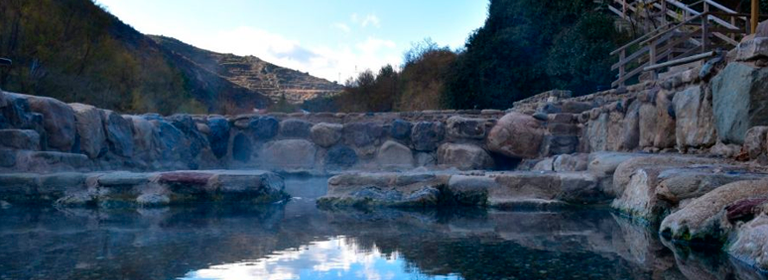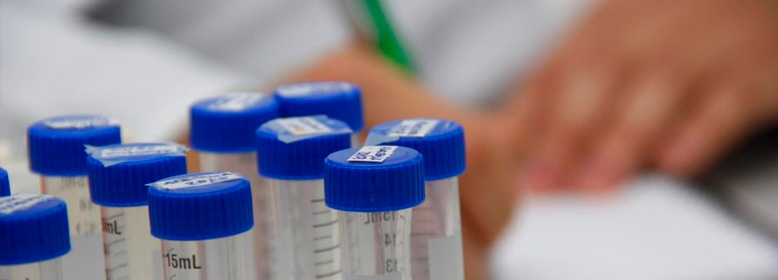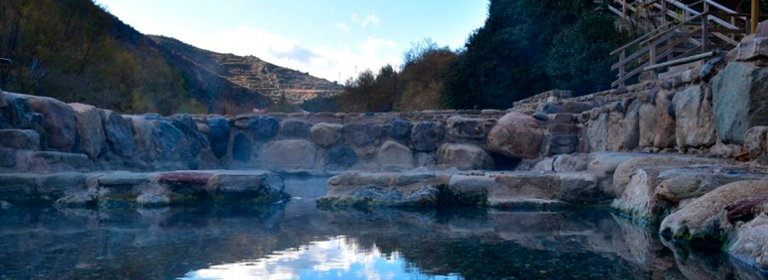Shrabana Sarkar, Ph.D. in Botany, discusses the BioPol project.
 Hot springs are said to have healing and health-promoting qualities, but a recent study also points to negative effects. «This last summer I took samples and I saw that they are very colored waters with a sulfurous smell. Their analysis also reveals a high concentration of arsenic and iron. In high concentrations and for a long period of time, these metals are not good for health and can cause skin lesions and skin cancer», warned Dr. Shrabana Sarkar, a member of the Center for Advanced Studies Research (CIEAM) of the Catholic University of Maule (UCM).
Hot springs are said to have healing and health-promoting qualities, but a recent study also points to negative effects. «This last summer I took samples and I saw that they are very colored waters with a sulfurous smell. Their analysis also reveals a high concentration of arsenic and iron. In high concentrations and for a long period of time, these metals are not good for health and can cause skin lesions and skin cancer», warned Dr. Shrabana Sarkar, a member of the Center for Advanced Studies Research (CIEAM) of the Catholic University of Maule (UCM).
Dr. Sarkar is conducting the first study on the contamination of mineral waters that spring from the ground to the surface in our region. «Many thermal waters are connected to rivers. Metals of geothermal origin naturally enrich river water also when they come into contact with it and can have a negative effect,» she emphasized.
An expert in microbial biotechnology, the academic tries to use the same microbes that live in the environment to improve water quality. «Several microorganisms that thrive in extreme environments, such as hot springs, form polysaccharides to survive the harmful effects of the hostile environment in which they live, such as high temperatures and the presence of heavy metals. The chemical structure of some polysaccharides has a negative charge that can be used for bioaccumulation and biosorption of toxic heavy metals, functioning as a mechanism for bioremediation of contaminated waters,» she explained.
As part of her doctoral thesis for Burdwan University in India, the scientist found a similar solution for wastewater from the massive textile industry in her native Rishra in West Bengal a few years ago. «The reaction of the polysaccharide to the extreme environment serves as a mechanism to modify or degrade the structure of the dyes. In the background, it discolors and cleans the water,» she noted.
The BioPol project (FOVI220149), financed by the National Agency for Research and Development (ANID), is an initiative to promote linkages that has facilitated the creation of the first international network in Chile to analyze different biotechnological aspects of biological polysaccharides. With the help of a multidisciplinary group of national and international researchers in which also participate Dr. Alexander Galán from CIEAM, UCM as alternate director and Cynthia Meza, PhD student in Transnational Biotechnology, Faculty of Agricultural and Forestry Sciences, UCM; Dr. Aparna Banerjee, director of this project, is working on the application of these bacterial exopolysaccharides in the food industry. However, as part of this project, I intend to evaluate the role of these compounds in the treatment of water naturally contaminated with metals. Recently, in collaboration with Dr. Banerjee we published in the prestigious journal «Applied Biochemistry and Biotechnology» (Springer Nature). This paper (https://doi.org/10.1007/s12010-023-04648-x) shows the potential use of polysaccharides isolated from extremophile bacteria in the treatment of contaminated water.
Experienced national and international researchers are associated in the BioPol project, mentioned below. National Researchers: Dr. Gustavo Cabrera Barjas from Universidad San Sebastian; Dr. Esteban Duran Lara and Dr. Adolfo Marican Riquelme from Universidad de Talca; Dr. Nicolás Guiliani from Universidad de Chile. International Researchers: Dr. Rajesh K. Sani from South Dakota School of Mines and Technology, United States and Dr. João Paulo Fabi from the University of São Paulo, Brazil.













